通用版 小学英语小升初专项复习 --情态动词 课件 (共34张PPT)
文档属性
| 名称 | 通用版 小学英语小升初专项复习 --情态动词 课件 (共34张PPT) |  | |
| 格式 | pptx | ||
| 文件大小 | 3.6MB | ||
| 资源类型 | 教案 | ||
| 版本资源 | 通用版 | ||
| 科目 | 英语 | ||
| 更新时间 | 2022-05-05 09:31:39 | ||
图片预览


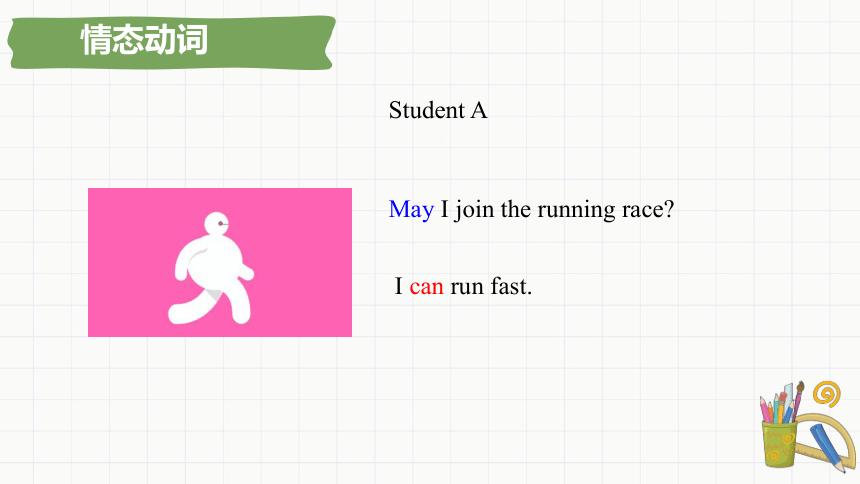
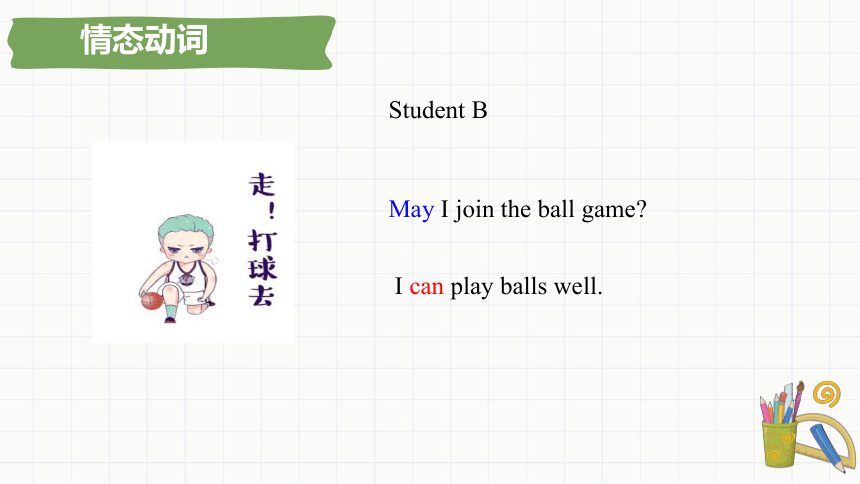
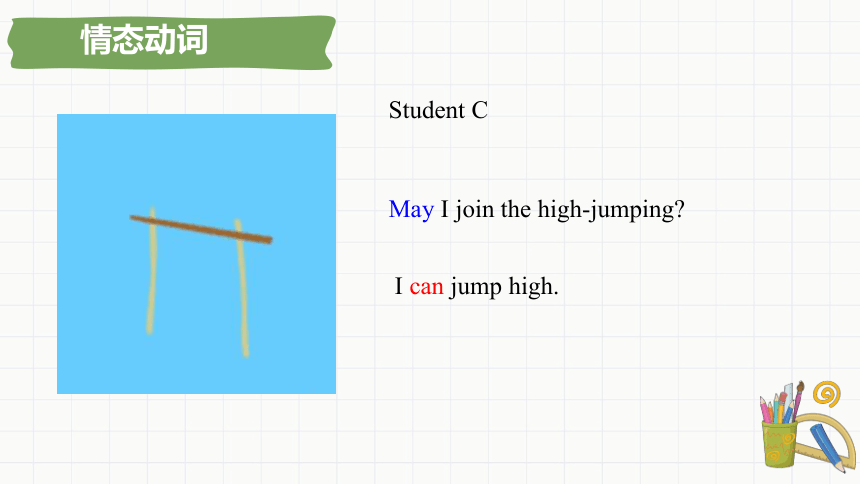
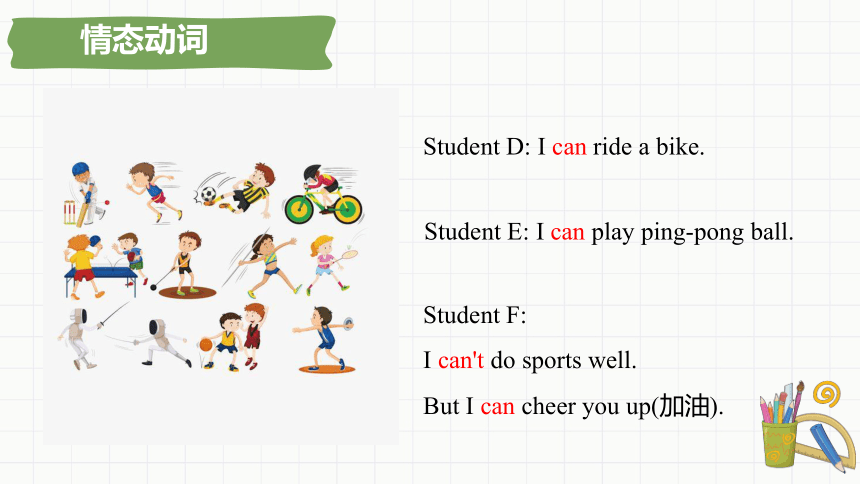
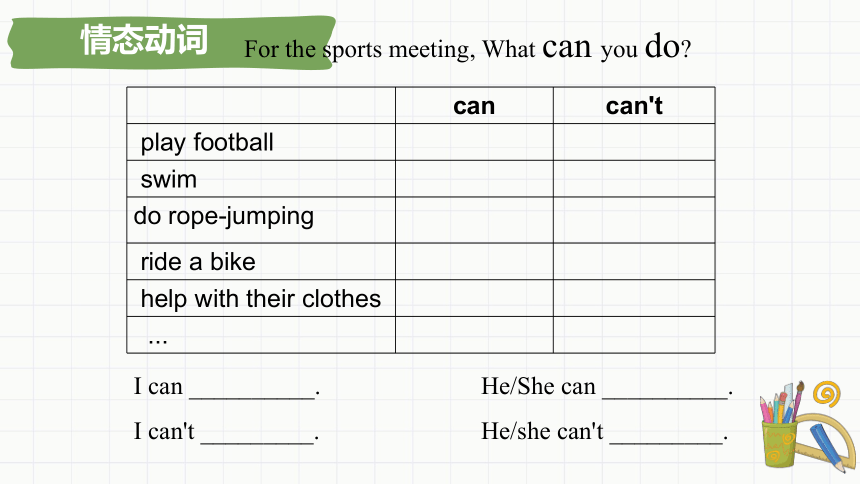
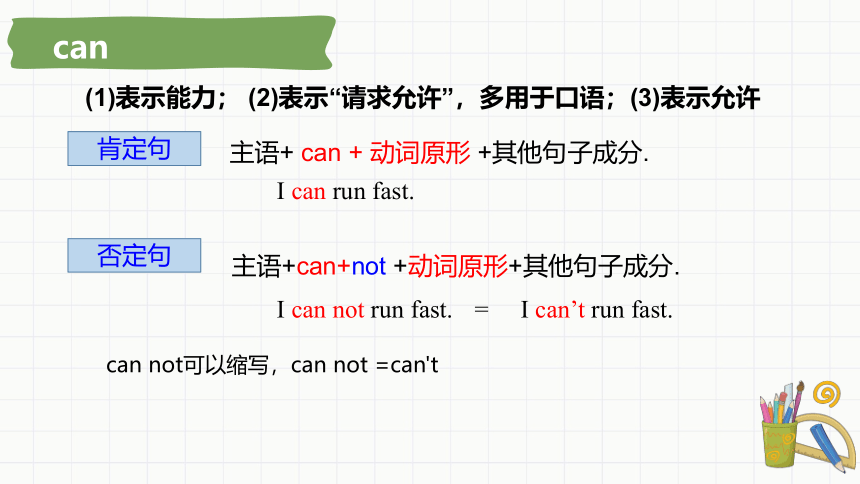
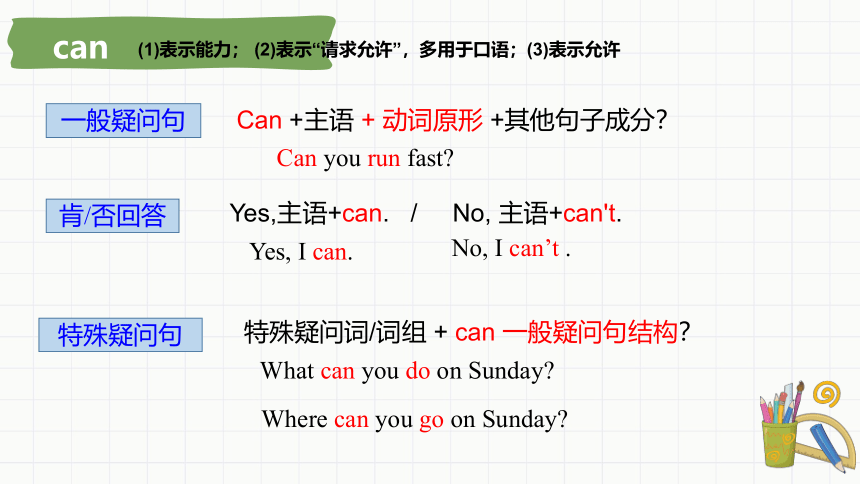
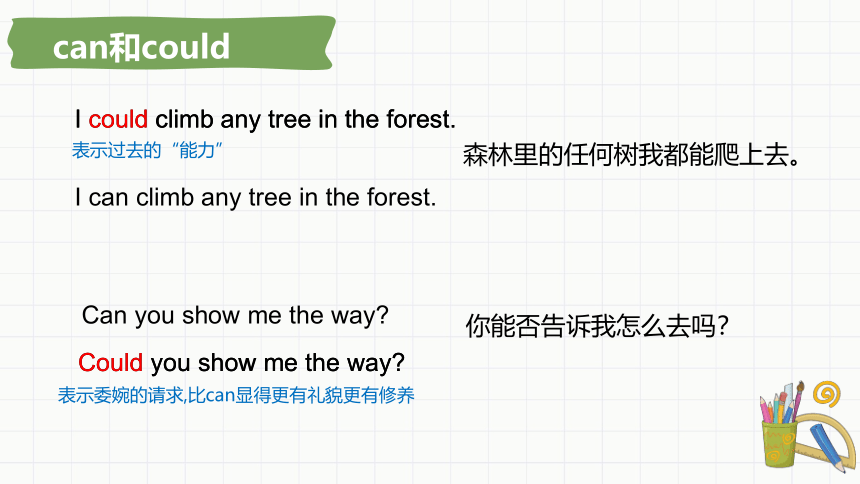
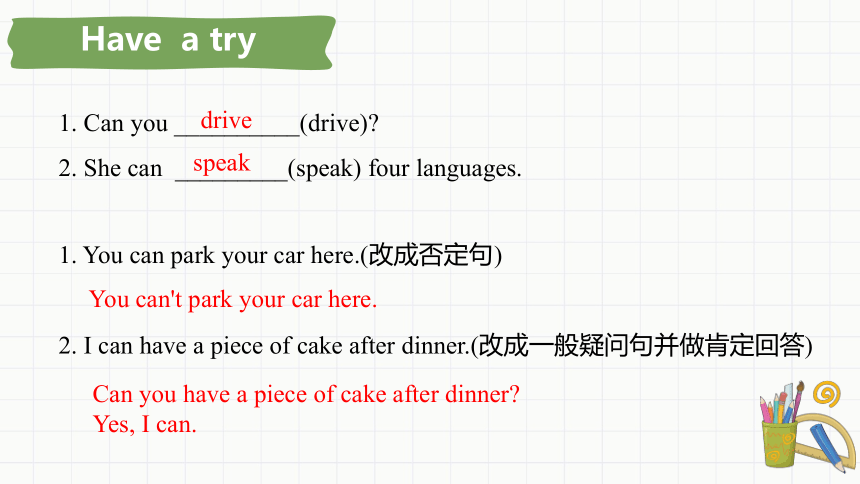
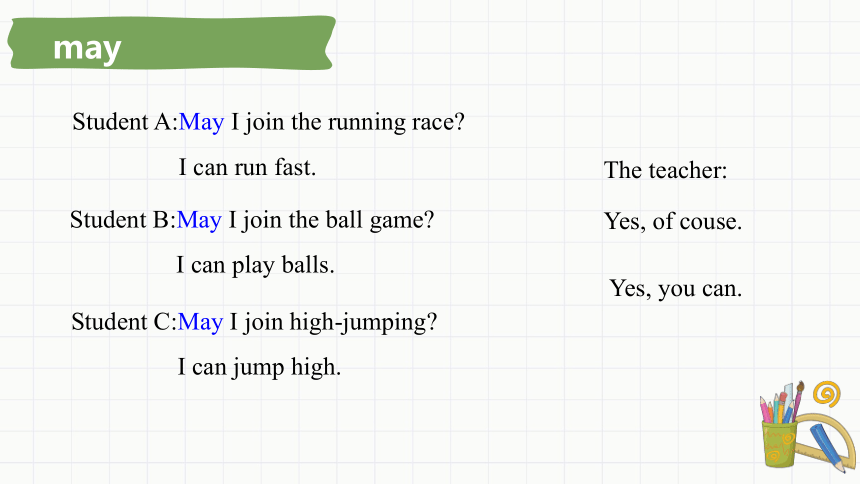
文档简介
(共34张PPT)
六年级英语
情态动词
情态动词
学校即将召开校运动会,同学们就参加运动会纷纷毛遂自荐:
情态动词
Student A
May I join the running race
I can run fast.
情态动词
Student B
May I join the ball game
I can play balls well.
情态动词
Student C
May I join the high-jumping
I can jump high.
情态动词
Student D: I can ride a bike.
Student E: I can play ping-pong ball.
Student F:
I can't do sports well.
But I can cheer you up(加油).
情态动词
For the sports meeting, What can you do
can can't
play football
swim
do rope-jumping
ride a bike
help with their clothes
...
I can __________.
I can't _________.
He/She can __________.
He/she can't _________.
can
肯定句
(1)表示能力; (2)表示“请求允许”,多用于口语;(3)表示允许
主语+ can + 动词原形 +其他句子成分.
否定句
主语+can+not +动词原形+其他句子成分.
I can run fast.
can not可以缩写,can not =can't
I can not run fast.
I can’t run fast.
=
can
一般疑问句
(1)表示能力; (2)表示“请求允许”,多用于口语;(3)表示允许
Can +主语 + 动词原形 +其他句子成分?
肯/否回答
Yes,主语+can. / No, 主语+can't.
Can you run fast
Yes, I can.
No, I can’t .
特殊疑问句
特殊疑问词/词组 + can 一般疑问句结构?
What can you do on Sunday
Where can you go on Sunday
can和could
I could climb any tree in the forest.
表示委婉的请求,比can显得更有礼貌更有修养
表示过去的“能力”
I can climb any tree in the forest.
Can you show me the way
Could you show me the way
森林里的任何树我都能爬上去。
I could climb any tree in the forest.
你能否告诉我怎么去吗?
Could you show me the way
Have a try
1. Can you __________(drive)
2. She can _________(speak) four languages.
1. You can park your car here.(改成否定句)
2. I can have a piece of cake after dinner.(改成一般疑问句并做肯定回答)
drive
speak
You can't park your car here.
Can you have a piece of cake after dinner
Yes, I can.
may
Yes, of couse.
Student A:May I join the running race
I can run fast.
Student B:May I join the ball game
I can play balls.
Student C:May I join high-jumping
I can jump high.
Yes, you can.
The teacher:
may
一般疑问句及回答,
通常用来征求对方的意见
May I come in
May I borrow your pen
May I have your name
may
陈述句中有may,又表示什么呢?
Jerry can come to my birthday party.
Tom may come to my birthday party.
Questions:
1. Will Jerry come to my birthday party (Yes/No/We don't know.)
2. Will Tom come to my birthday party (Yes/No/We don't know.)
陈述句中有may,通常用来表示同意,或者可能性
may
Tom may come to my birthday party.
(not)
Tom may not come to my birthday party.
may
肯定句
陈述句,通常用来表示同意,或者可能性
主语+ may + 动词原形 +其他句子成分.
否定句
主语+ may +not +动词原形+其他句子成分.
may not不可以缩写
may
一般疑问句及回答,通常用来征求对方的意见
一般疑问句
May +主语 + 动词原形 +其他句子成分?
肯/否回答
Yes, 主语+can. / No, 主语+can't.
may not
The kids may not go to school in the future.
Questions:
1. Will the kids study in the future (Yes/No/We don't know.)
2. Will the kids study at home (Yes/No/We don't know.)
3. Will the kids study on computers (Yes/No/We don't know.)
may be和maybe
Jerry may be not at home.
adv.
may + 动词原形be
Maybe Jerry isn’t at home.
Jerry 也许不在家。
也许Jerry不在家。
may be : 是两个词,可能(是)。否定时,只需要否定be动词。
maybe:是一个词,或许,也许。否定时,需要后面句子里的谓语动词。
Have a try
1. ( ) ---_______ I copy your homework
---No, you _______.
A.May; may not B.Can; may not C.May; can't
2.( ) ---______I ask you a question ---Sure.
A. May B. Would C. Do D. Must
你的钥匙也许在你的包里。(两种方式)
C
A
Your keys may be in your bag.
Maybe your keys are in your bag.
must
We must be there.
We're having the sports meeting.
We mustn't be absent.
Questions:
1. Is everyone there (Yes/No)
2. Can you stay at home (Yes/No)
must
He must stay in bed.
Jack is ill. He is at home.
He mustn't ear rich food.
Questions:
1. Can Jack get up (Yes/No)
2. Can Jack eat meat (Yes/No)
must
Jack must stay in bed.
Jack mustn't ear rich food.
We must be there.
We mustn't be absent.
must
mustn't
must mustn't
mustn't
We _________ be quite in the library.
We _________ wear the uniform in the school.
Teenergers _________ drink wine酒.
must
must
must 表示命令、建议,“必须”;否定形式mustn’t表示“禁止”
must
Must I finish the work before five o’clock
Yes, you must.
No, you mustn't .
×
No, you needn't.
need 需要,否定式needn't表示不必
must 和 have to
Your young sister is ill at home.
Your friend invites you to his birthday party.
A: Thank you for your invitation.
But I must look after my young sister at home.
have to常译为“不得不”,强调客观上的必要性
must强调主观意愿;
Which answer of the followings is better
B: Thank you for your invitation.
But I have to look after my young sister at home.
A: Thank you for your invitation.
But I must look after my young sister at home.
B: Thank you for your invitation.
But I have to look after my young sister at home.
√
Have a try
1. ( ) ---Must I answer it in English
---No, you _______. You can use Chinese.
A. shouldn’t B. can’t
C. mustn’t D. needn’t
2.( ) David, you_____ play with the valuable bottle, you _____break it. A. won`t; can`t B. mustn`t; may
C. shouldn`t; must D. can`t; shouldn`t
D
B
Have a try
我们在家必须帮助父母做家务事。
因为下午我们不得不带上伞。
We ______ _______our parents with housework at home.
have to bring
must help
We ______ _______ _______ our umbrellas because of the rain.
情态动词
can
may
must
have to
can't
may not
mustn't ; needn't
not have to
禁止 不必
+ 动词原形
1.无人称和数的变化;
2.句子变化时,用法相当于be动词;
3.后面紧跟动词原形;
情态动词小口诀
动词原形接后面,说话语气较委婉。
can "能力",may"许可",must"责任"或"义务",need"需要"。
Must询问,否定回答needn’t换。
May提问,can回答。
情态动词表推测
---That black T-shirt with YaoMing's picture on it ______belong to(属于) David.
He admires(崇拜) him a lot.
---No, it _____ be his. He hates black colour.
A. must, can’t B. may, can’t C. can, mustn’t D. must, mustn’t
有理由,否定疑问用上can,肯定首选must;
may,可能性,比can小
√
---Is that woman Mrs. Yang
---No, she _____ be Mrs. Yang. She has gone to Shanghai.
A.can’t B.needn’t C.mustn’t D.won’t
√
字体:18, 黑体-简
Last try
1.I can ________(stand) on my head.
(用所给词正确形式填空)
2.( )---Must I do it now
---No, you ______ .
A.aren't B.can't C.mustn't D.needn't
D
stand
See you next time !
六年级英语
情态动词
情态动词
学校即将召开校运动会,同学们就参加运动会纷纷毛遂自荐:
情态动词
Student A
May I join the running race
I can run fast.
情态动词
Student B
May I join the ball game
I can play balls well.
情态动词
Student C
May I join the high-jumping
I can jump high.
情态动词
Student D: I can ride a bike.
Student E: I can play ping-pong ball.
Student F:
I can't do sports well.
But I can cheer you up(加油).
情态动词
For the sports meeting, What can you do
can can't
play football
swim
do rope-jumping
ride a bike
help with their clothes
...
I can __________.
I can't _________.
He/She can __________.
He/she can't _________.
can
肯定句
(1)表示能力; (2)表示“请求允许”,多用于口语;(3)表示允许
主语+ can + 动词原形 +其他句子成分.
否定句
主语+can+not +动词原形+其他句子成分.
I can run fast.
can not可以缩写,can not =can't
I can not run fast.
I can’t run fast.
=
can
一般疑问句
(1)表示能力; (2)表示“请求允许”,多用于口语;(3)表示允许
Can +主语 + 动词原形 +其他句子成分?
肯/否回答
Yes,主语+can. / No, 主语+can't.
Can you run fast
Yes, I can.
No, I can’t .
特殊疑问句
特殊疑问词/词组 + can 一般疑问句结构?
What can you do on Sunday
Where can you go on Sunday
can和could
I could climb any tree in the forest.
表示委婉的请求,比can显得更有礼貌更有修养
表示过去的“能力”
I can climb any tree in the forest.
Can you show me the way
Could you show me the way
森林里的任何树我都能爬上去。
I could climb any tree in the forest.
你能否告诉我怎么去吗?
Could you show me the way
Have a try
1. Can you __________(drive)
2. She can _________(speak) four languages.
1. You can park your car here.(改成否定句)
2. I can have a piece of cake after dinner.(改成一般疑问句并做肯定回答)
drive
speak
You can't park your car here.
Can you have a piece of cake after dinner
Yes, I can.
may
Yes, of couse.
Student A:May I join the running race
I can run fast.
Student B:May I join the ball game
I can play balls.
Student C:May I join high-jumping
I can jump high.
Yes, you can.
The teacher:
may
一般疑问句及回答,
通常用来征求对方的意见
May I come in
May I borrow your pen
May I have your name
may
陈述句中有may,又表示什么呢?
Jerry can come to my birthday party.
Tom may come to my birthday party.
Questions:
1. Will Jerry come to my birthday party (Yes/No/We don't know.)
2. Will Tom come to my birthday party (Yes/No/We don't know.)
陈述句中有may,通常用来表示同意,或者可能性
may
Tom may come to my birthday party.
(not)
Tom may not come to my birthday party.
may
肯定句
陈述句,通常用来表示同意,或者可能性
主语+ may + 动词原形 +其他句子成分.
否定句
主语+ may +not +动词原形+其他句子成分.
may not不可以缩写
may
一般疑问句及回答,通常用来征求对方的意见
一般疑问句
May +主语 + 动词原形 +其他句子成分?
肯/否回答
Yes, 主语+can. / No, 主语+can't.
may not
The kids may not go to school in the future.
Questions:
1. Will the kids study in the future (Yes/No/We don't know.)
2. Will the kids study at home (Yes/No/We don't know.)
3. Will the kids study on computers (Yes/No/We don't know.)
may be和maybe
Jerry may be not at home.
adv.
may + 动词原形be
Maybe Jerry isn’t at home.
Jerry 也许不在家。
也许Jerry不在家。
may be : 是两个词,可能(是)。否定时,只需要否定be动词。
maybe:是一个词,或许,也许。否定时,需要后面句子里的谓语动词。
Have a try
1. ( ) ---_______ I copy your homework
---No, you _______.
A.May; may not B.Can; may not C.May; can't
2.( ) ---______I ask you a question ---Sure.
A. May B. Would C. Do D. Must
你的钥匙也许在你的包里。(两种方式)
C
A
Your keys may be in your bag.
Maybe your keys are in your bag.
must
We must be there.
We're having the sports meeting.
We mustn't be absent.
Questions:
1. Is everyone there (Yes/No)
2. Can you stay at home (Yes/No)
must
He must stay in bed.
Jack is ill. He is at home.
He mustn't ear rich food.
Questions:
1. Can Jack get up (Yes/No)
2. Can Jack eat meat (Yes/No)
must
Jack must stay in bed.
Jack mustn't ear rich food.
We must be there.
We mustn't be absent.
must
mustn't
must mustn't
mustn't
We _________ be quite in the library.
We _________ wear the uniform in the school.
Teenergers _________ drink wine酒.
must
must
must 表示命令、建议,“必须”;否定形式mustn’t表示“禁止”
must
Must I finish the work before five o’clock
Yes, you must.
No, you mustn't .
×
No, you needn't.
need 需要,否定式needn't表示不必
must 和 have to
Your young sister is ill at home.
Your friend invites you to his birthday party.
A: Thank you for your invitation.
But I must look after my young sister at home.
have to常译为“不得不”,强调客观上的必要性
must强调主观意愿;
Which answer of the followings is better
B: Thank you for your invitation.
But I have to look after my young sister at home.
A: Thank you for your invitation.
But I must look after my young sister at home.
B: Thank you for your invitation.
But I have to look after my young sister at home.
√
Have a try
1. ( ) ---Must I answer it in English
---No, you _______. You can use Chinese.
A. shouldn’t B. can’t
C. mustn’t D. needn’t
2.( ) David, you_____ play with the valuable bottle, you _____break it. A. won`t; can`t B. mustn`t; may
C. shouldn`t; must D. can`t; shouldn`t
D
B
Have a try
我们在家必须帮助父母做家务事。
因为下午我们不得不带上伞。
We ______ _______our parents with housework at home.
have to bring
must help
We ______ _______ _______ our umbrellas because of the rain.
情态动词
can
may
must
have to
can't
may not
mustn't ; needn't
not have to
禁止 不必
+ 动词原形
1.无人称和数的变化;
2.句子变化时,用法相当于be动词;
3.后面紧跟动词原形;
情态动词小口诀
动词原形接后面,说话语气较委婉。
can "能力",may"许可",must"责任"或"义务",need"需要"。
Must询问,否定回答needn’t换。
May提问,can回答。
情态动词表推测
---That black T-shirt with YaoMing's picture on it ______belong to(属于) David.
He admires(崇拜) him a lot.
---No, it _____ be his. He hates black colour.
A. must, can’t B. may, can’t C. can, mustn’t D. must, mustn’t
有理由,否定疑问用上can,肯定首选must;
may,可能性,比can小
√
---Is that woman Mrs. Yang
---No, she _____ be Mrs. Yang. She has gone to Shanghai.
A.can’t B.needn’t C.mustn’t D.won’t
√
字体:18, 黑体-简
Last try
1.I can ________(stand) on my head.
(用所给词正确形式填空)
2.( )---Must I do it now
---No, you ______ .
A.aren't B.can't C.mustn't D.needn't
D
stand
See you next time !
